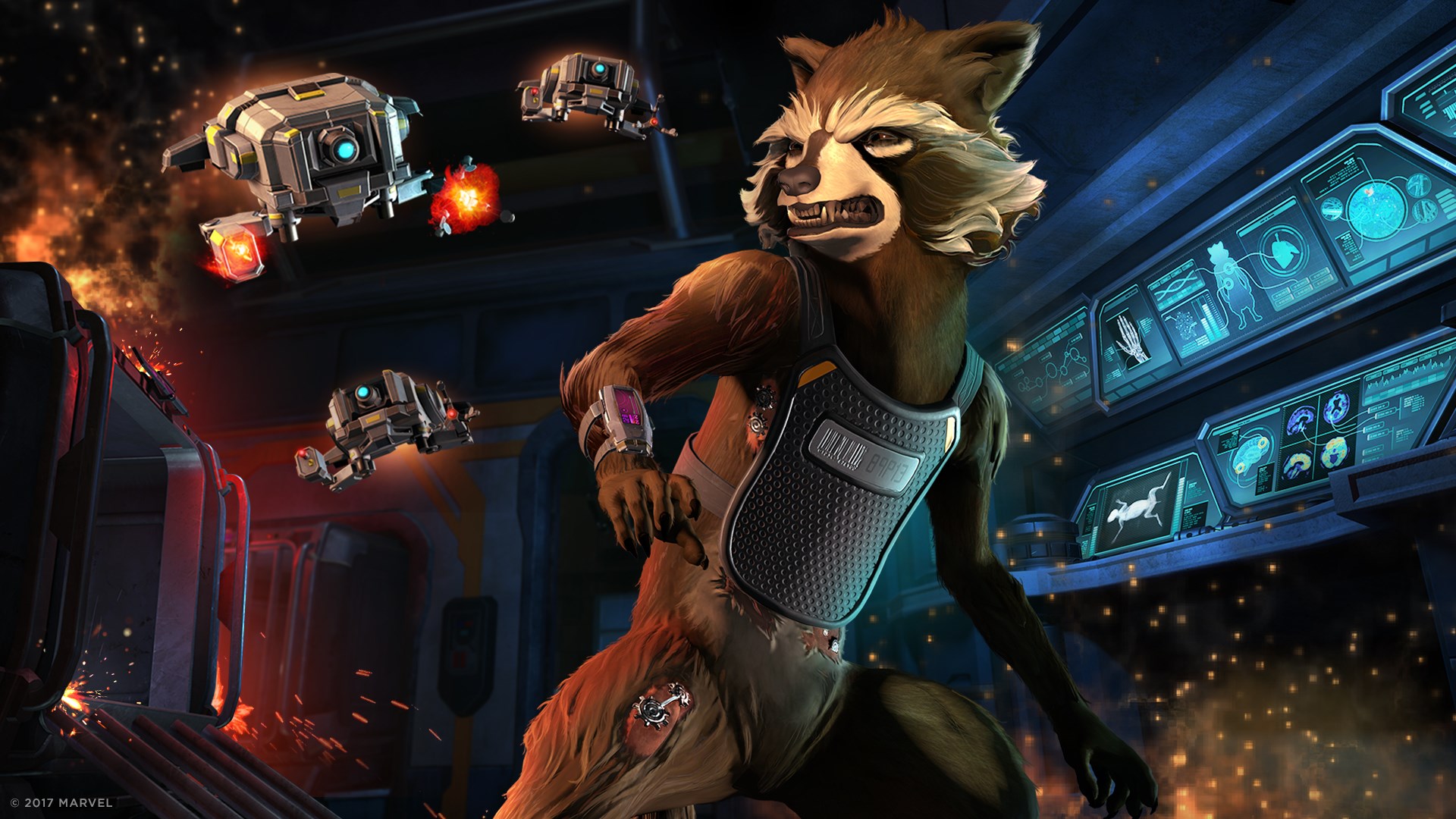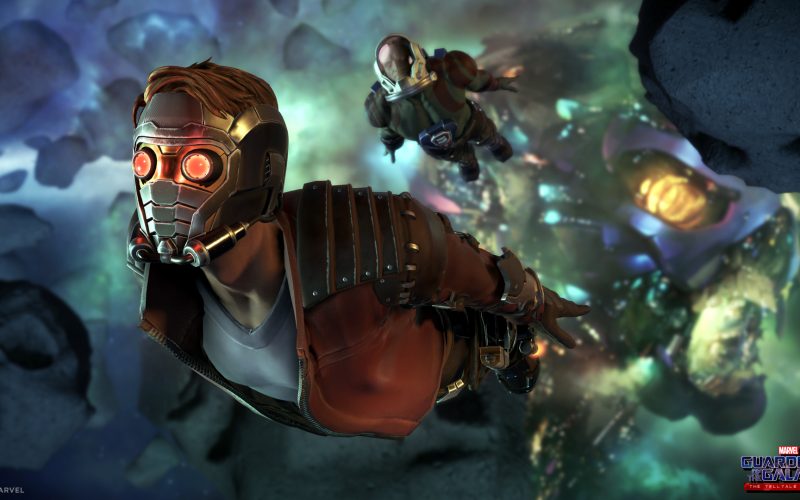Guardians of the Galaxy: The Telltale Series (2017) – Review.
Rather than put its own spin on Marvel’s cosmic band of misfits, Telltale Games plays it safe and gives us a well told, competently made story that’s too reminiscent of James Gunn’s big screen comic book adaptation.
Back in 2015 Marvel entered a licensing deal with adventure game developer Telltale Games (who have since become insistent on dropping the “Games” portion of the company’s title, a clear indication of how they envision themselves in the present and going forward), and it was only a matter of time before a project was put in the works. And perhaps Guardians was the predictable choice, given its current popularity. Considering too the success of Telltale’s most recent sci-fi romp, Tales from the Borderlands, Guardians had all of the potential in the world. In some ways it succeeds, though in others it leaves something to be desired. That’s fitting considering it’s probably the developer’s most uneven series to date.
Maybe that disappointment stems from the fact that the series promises so much in its first episode but fails to live up to its own ambition. Killing off Thanos is a bold move and does plenty to ensure players separate this story from the ones we’ve been seeing on the big screen. The five-episode series features very few examples of this though, and much fewer than we’re accustomed to when we consider the liberties taken with Gotham City in Telltale’s Batman series. The cast of characters here is identical to that of the films, making this feel a little too familiar and at times the comedy and action comes across as watered down by comparison.
 Uneven though it may be, found within the five episodes is some of Telltale’s best work. The classic quick-time events with which Telltale continually amps up its cinematic flare on every new release, have never been better as the sequences alternate from one Guardian to the next. It employs each character’s most notable attributes in battle and offers some of the rare instances in which the team works in unison. Telltale is showing us just how well this team can work together before it spends an enormous chunk of time showing us that they’re just as good at tearing each other apart. The game is even more committed to questioning the dynamic of the team and why it stays together than the films are, going so far as forcing us to question just how tolerable certain characters can be.
Uneven though it may be, found within the five episodes is some of Telltale’s best work. The classic quick-time events with which Telltale continually amps up its cinematic flare on every new release, have never been better as the sequences alternate from one Guardian to the next. It employs each character’s most notable attributes in battle and offers some of the rare instances in which the team works in unison. Telltale is showing us just how well this team can work together before it spends an enormous chunk of time showing us that they’re just as good at tearing each other apart. The game is even more committed to questioning the dynamic of the team and why it stays together than the films are, going so far as forcing us to question just how tolerable certain characters can be.
The story essentially revolves around an object called the Eternity Forge, which holds immense powers. One of these is the ability to bring a loved one back from the dead, something that the Kree villain of the series, Hala wants desperately. Hala is a mostly grating villain who, despite the extra layer shed by the end of the game, is certainly one of the less enticing aspects of the story. Villain aside, and with such an emphasis on character backstories, the fate of the Eternity Forge is a perfect thematic crux for the narrative.
The hallmark of any of these games is in the dialogue options and the impact of choice, which may or may not affect relationships within the group. Certain actions and responses can upset one Guardian and please another and it’s near impossible to satisfy everyone. When it comes to the choices given to the player, there’s a slew of details proving just how much care went into the series. These details can be minute, like one line of dialogue referencing an earlier choice, or it can severely affect a relationship, like when a character loses faith in your ability to lead the team. Again, in these scenarios the game promises so much only to wrap things up in a neat bow. Most of these moments become obsolete. Episode Five does however conclude the series with several different potential results based on an Episode Three choice, and gives the player quite a substantial decision to make.
 A majority of the game is played as Star-Lord and he may rub players the wrong way if they’ve become too used to the somber, grimmer style of Telltale lead. While there’s plenty of depth to explore with Peter Quill (as with the flashbacks that come with each episode providing some of the series’ most poignant moments), his pompous and tongue-in-cheek demeanor is hard to avoid even with what seem to be the most genuine dialogue options. Still, there’s plenty of moments where the humour completely works, most competently through the characters Drax and Groot (including an hilarious sequence in Episode Four in which Groot seemingly gets high on a particular type of flower). Apart from Peter’s requisite flashbacks, each episode provides a playable glimpse at each member’s past to varying degrees of success. These flashbacks, along with Quill’s final interaction with Mantis in episode five, really emphasize the series’ themes.
A majority of the game is played as Star-Lord and he may rub players the wrong way if they’ve become too used to the somber, grimmer style of Telltale lead. While there’s plenty of depth to explore with Peter Quill (as with the flashbacks that come with each episode providing some of the series’ most poignant moments), his pompous and tongue-in-cheek demeanor is hard to avoid even with what seem to be the most genuine dialogue options. Still, there’s plenty of moments where the humour completely works, most competently through the characters Drax and Groot (including an hilarious sequence in Episode Four in which Groot seemingly gets high on a particular type of flower). Apart from Peter’s requisite flashbacks, each episode provides a playable glimpse at each member’s past to varying degrees of success. These flashbacks, along with Quill’s final interaction with Mantis in episode five, really emphasize the series’ themes.
While I’m not convinced that the series nails its attempt at relaying to us just why Peter, Gamora, Drax, Groot, and Rocket belong together, it nevertheless competently explores the relationships between these characters and how they’re hindered by their individual histories. Their shared pain seems to cause more problems than anything, both in-game as well as from a narrative perspective, the writers perhaps push things too far in their efforts to wedge characters apart.
Guardians of the Galaxy: The Telltale Series marks a high water mark in terms of passion projects for the Telltale team and you can tell. A clear love of these characters is apparent leading to far less action and far more interaction. Unfortunately it falls prey to its own need for things to turn out alright, making for faux risks that just don’t pay off. On this rare occasion Telltale plays it safe and has produced an enjoyable but unremarkable sci-fi adventure. With an ominous teaser for a second season or some potential DLC, here’s hoping the writers shed the internal feuding and consequently allow the characters time to have more fun saving the galaxy.
Film ’89 Verdict – 7/10
All Five episodes of Guardians of the Galaxy: The Telltale Series are available now.


